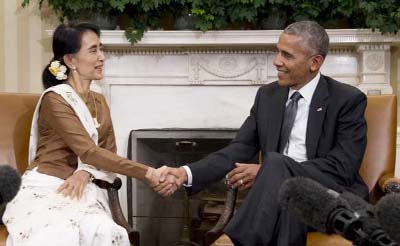
AFP, Washington :
President Barack Obama moved to restore trade benefits to Myanmar and said broader sanctions would soon be scrapped, as he hosted de facto leader Aung San Suu Kyi at the White House Wednesday.
Welcoming Suu Kyi for the first time since her historic election victory last year, Obama announced a series of steps that would end the rapidly changing southeast Asian country’s decades of economic isolation.
“The United States is now prepared to lift sanctions that we have imposed on Burma for quite some time,” Obama said, adding that the move would come “soon.”
“It is the right thing to do to ensure that the people of Burma see rewards for a new way of doing business.”
Earlier in a letter to Congress, Obama said he was reinstating preferential tariffs for poor countries including Myanmar, where they had been suspended more than two decades ago amid rights abuses by the ruling junta. The White House is keen to help Myanmar’s economy and Suu Kyi’s administration-which is managing a difficult transition from military-run pariah to full-fledged democracy.
The 71-year-old Nobel Peace Prize laureate is barred by military constitution from technically heading Myanmar’s government, but she got a leader’s welcome in Washington.
After talks with Obama, Suu Kyi received a coveted Oval Office grip-and-grin photo shoot.
Obama turned to the once-imprisoned democracy leader and offered his “congratulations on the progress that has been made.”
“It’s a good news story in an era when so often we see countries going the opposite direction,” he said, while acknowledging a lot of work remains to be done.
Officially Suu Kyi is foreign minister and self-appointed state counsellor-a role akin to prime minister.
After spending much of the last few decades under arrest, she now de facto presides over a skeletal government, an economy hollowed out by decades of kleptocratic dictatorship and a country riven with ethnic and religious violence.
The veteran campaigner must tackle all those problems while keeping an eye on the generals, lest they have second thoughts about reform.
US officials acknowledge Suu Kyi is working with some very tough political constraints and dare not push the military, or the public, too far or too fast.
“She has to tackle problems one by one” said Ben Rhodes, a key Obama aide who has spearheaded the administration’s Myanmar policy.
President Barack Obama moved to restore trade benefits to Myanmar and said broader sanctions would soon be scrapped, as he hosted de facto leader Aung San Suu Kyi at the White House Wednesday.
Welcoming Suu Kyi for the first time since her historic election victory last year, Obama announced a series of steps that would end the rapidly changing southeast Asian country’s decades of economic isolation.
“The United States is now prepared to lift sanctions that we have imposed on Burma for quite some time,” Obama said, adding that the move would come “soon.”
“It is the right thing to do to ensure that the people of Burma see rewards for a new way of doing business.”
Earlier in a letter to Congress, Obama said he was reinstating preferential tariffs for poor countries including Myanmar, where they had been suspended more than two decades ago amid rights abuses by the ruling junta. The White House is keen to help Myanmar’s economy and Suu Kyi’s administration-which is managing a difficult transition from military-run pariah to full-fledged democracy.
The 71-year-old Nobel Peace Prize laureate is barred by military constitution from technically heading Myanmar’s government, but she got a leader’s welcome in Washington.
After talks with Obama, Suu Kyi received a coveted Oval Office grip-and-grin photo shoot.
Obama turned to the once-imprisoned democracy leader and offered his “congratulations on the progress that has been made.”
“It’s a good news story in an era when so often we see countries going the opposite direction,” he said, while acknowledging a lot of work remains to be done.
Officially Suu Kyi is foreign minister and self-appointed state counsellor-a role akin to prime minister.
After spending much of the last few decades under arrest, she now de facto presides over a skeletal government, an economy hollowed out by decades of kleptocratic dictatorship and a country riven with ethnic and religious violence.
The veteran campaigner must tackle all those problems while keeping an eye on the generals, lest they have second thoughts about reform.
US officials acknowledge Suu Kyi is working with some very tough political constraints and dare not push the military, or the public, too far or too fast.
“She has to tackle problems one by one” said Ben Rhodes, a key Obama aide who has spearheaded the administration’s Myanmar policy.

